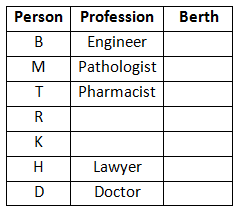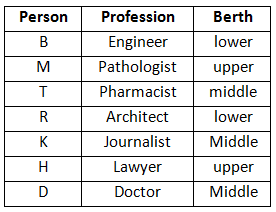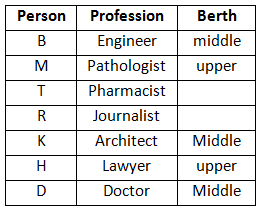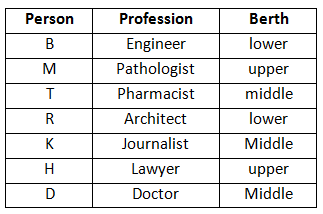logical reasoning types: logical reasoning types of questions that you should solve for the exams
Logical reasoning types of questions that are usually asked in almost all the exams are listed below:
1. Identify/strengthen/weaken the conclusion
2. Point of contention/agreement
3. Identify must be true/assumptions
4. Sequence/series/patterns
5. Blood relations
6. Games & Tournaments
7. Ranking/Ordering
8. Machine Input/Output
9. Syllogisms
10. Arrangements
By being aware of the logical reasoning types of questions that can be asked and gaining first hand practice of each one of them, you are sure to score supremely well in this section. Identify the frequency and difficulty level of each one of the question types and accordingly work on your speed. The frequency and difficulty of each of the logical reasoning types of questions is different for different exams, wherein some may focus on your speed and others on your accuracy. Therefore, prepare for it accordingly.
Directions for the question set:
Study the following information carefully and answer the questions given below:
B, M, T, R, K, H and D are travelling in a train compartment with III tier sleeper berth. Each of them has a different profession of Engineer, doctor, Architect, Pharmacist, Lawyer, journalist and Pathologist. They occupied two lower berths, three middle berths and two upper berths.
B, the Engineer is not in the upper berth. The architect is the only other person who occupies the same type of berth as that of B. M and H are not on the middle berth and their professions are Pathologist and Lawyer respectively. T is a Pharmacist. D is neither a journalist nor an Architect. K occupies same type of berth as that of the Doctor.
Question 1: What is D’s profession?
(a) Doctor
(b) Engineer
(c) Lawyer
(d) Pharmacist
Question 2: Which of the following group occupies middle berth?
(a) DKR
(b) DHT
(c) HKT
(d) DKT
Question 3: Which of following combination of person-berth-profession is correct?
(a) R-Lower-Journalist
(b) R-Lower-Architect
(c) D-Upper-Doctor
(d) K- Upper- Lawyer
Question 4: Which of the following pairs occupy the lower berth?
(a) BD
(b) BK
(c) BT
(d) None of these
Question 5: Who is the Architect?
(a) D
(b) H
(c) R
(d) Data inadequate
Answers and Explanations: Click the down arrow to expand
based on the given information we can make the following Table. lower berths, middle & upper berths.

B, is not on the upper berth. The architect is the only other person who occupies the same type of berth as that of B. M and H are not on the middle berth
We can consider here two cases that one B is in lower Birth and other that B is in Middle birth
if B is lower birth then M cannot be in Lower because H will be in lower and there will be three cases of lower birth which is wrong they should be in upper because they are not travelling in middle birth.
K occupies same type of berth as that of the Doctor. So, K & Doctor will be on lower birth and upper birth because they will be three so K & Doctor occupy middle birth.
From the above given information, we can identify all the persons along with their professions accept R and K As K occupy middle birth so he is not an architect. R will be an architect occupy same birth as B that is lower birth. K’s Profession will be Journalist & T, the pharmacist, occupy Middle Birth.

Other case of B occupies Middle birth same birth is for the architect. K occupies same type of berth as that of the Doctor. So, K could be the architect. R can be the Journalist.

Here, in this scenario we are not able to determine the birth of many people so this case is not Possible
Which means that 1st case is possible Final arrangement of following information will be.

Answer 1: (a) D is a Doctor by profession. The correct option is (a).
Answer 2: (d) DKT occupy the middle berth. The correct option is (d).
Answer 3: (b) R-Lower-Architect is the right combination. The correct option is (b).
Answer 4: (d) B occupies the lower berth, but the others do not. The correct option is (d).
Answer 5: (c) R is the architect. The correct option is (c).
Extra tips for logical reasoning types:
• Try to cover all logical reasoning types of questions possible to save time in exam that goes into understanding a new question format.
• While solving various logical reasoning types of questions, it often happens that there are multiple possibilities in the initial steps. Make sure you account for those and do not miss considering any case.
• Cover all logical reasoning types of questions from various topics to sharpen your analytical abilities and boost your score in the exam.













